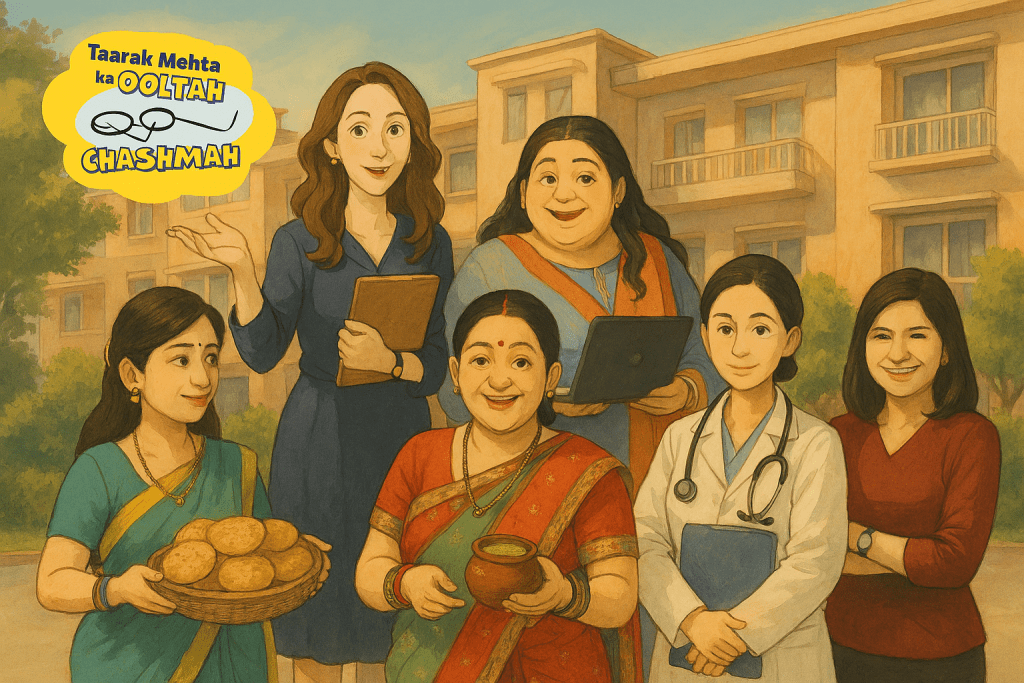Last evening, over dinner, my teenage daughter asked a question that stopped me mid-bite.
“Why doesn’t any woman in Taarak Mehta Ka Ooltah Chashmah have a job? Is that how India is?”
It wasn’t just a question. It was a mirror.
Held up to decades of prime-time television.
And it revealed a flaw that many of us grew up not noticing.
Let’s talk about it.
A Neighborhood Stuck in Time
Gokuldham Society — the fictional Mumbai neighborhood in Taarak Mehta — is meant to be a microcosm of India.
It’s diverse, funny, well-meaning.
But it’s also oddly dated when it comes to gender roles.
Among all the laughter, daily dilemmas, and community bonding, there’s a silent pattern that hasn’t changed in over a decade:
All the women — except Madhavi — are homemakers.
Their lives revolve around kitchens, gossip, shopping, and the occasional social event.
And none of them have careers, startups, freelance dreams, or ambitions outside the home.
Even the “modern” characters, like Babita, have no professional identity.
This isn’t just storytelling. It’s a signal. And kids like mine are picking up on it.
The Invisible Message
TV shows don’t just entertain.
They educate — sometimes more powerfully than schoolbooks.
And what Taarak Mehta (and many shows like it) seem to be telling our daughters is:
Your place is in the home. Your story ends there.
What about the millions of Indian women who are doctors, entrepreneurs, designers, coders, CEOs, artists, politicians?
Where are their stories?
We have children watching this show during dinner, every single night.
We teach them about equality, empowerment, independence.
But the screen tells them something else.
Imagine If Gokuldham Evolved
What if the writers flipped the script?
- Anjali Mehta opens a health café, expanding on her passion for diet food.
- Babita becomes a fashion influencer, or a tech consultant.
- Daya starts a YouTube comedy channel — and it blows up.
- Komal turns her cooking skills into a thriving tiffin service.
- Roshan Sodhi launches a cultural boutique for Punjabi arts and crafts.
- Madhavi scales up her papad business online and mentors other women.
Imagine the conversations this would spark in homes.
Imagine the encouragement it would give to girls — and boys — watching.
Imagine Taarak Mehta becoming not just a comedy, but a catalyst.
TV Has a Responsibility — And an Opportunity
We’re not asking every show to be an activism platform.
But representation isn’t a favor — it’s a responsibility.
When millions tune in, you’re shaping culture.
You’re normalizing what’s acceptable, what’s aspirational, what’s possible.
And if we want an India where our daughters dream big, then our fiction must reflect that too.
To My Daughter — and Every Young Mind Watching
No, India is not like that. Not anymore.
Millions of women work, lead, innovate, and thrive.
And hopefully, one day, Gokuldham Society will catch up.
But until then, thank you for asking the question.
It’s the kind of question that starts change.
Let’s keep asking. Let’s keep evolving. Let’s demand better stories.
For our daughters. And for the future we’re all responsible for writing.


